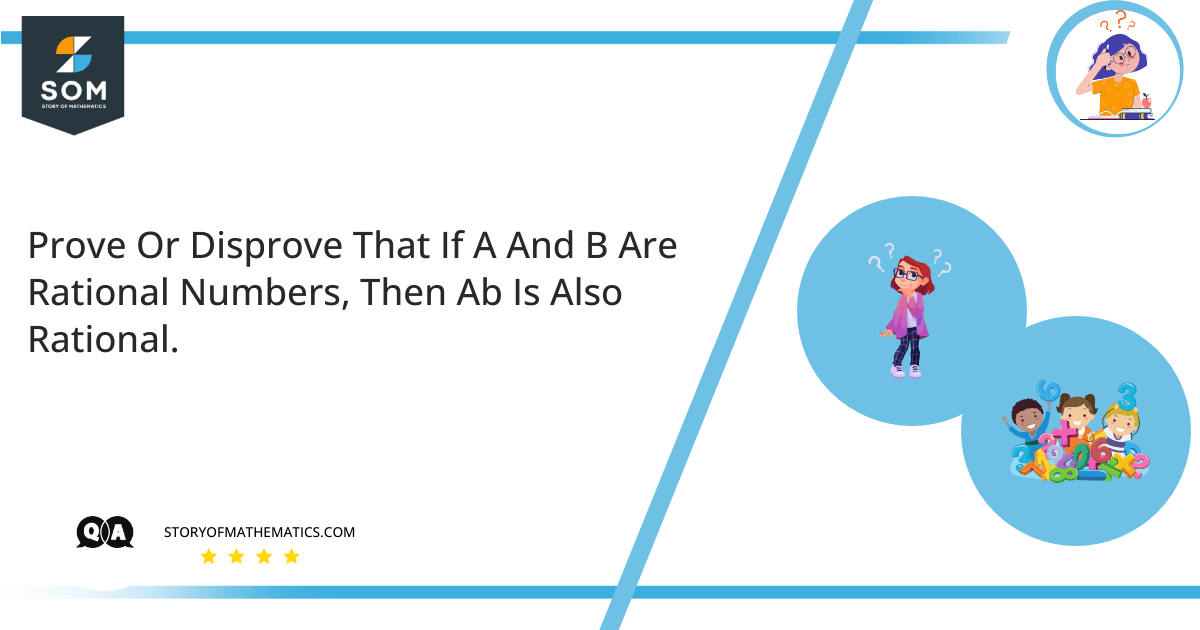
The article aims to prove or disprove that if two numbers a and b are rational, then a^b is also rational.
Rational numbers can be expressed as fractions, positive, negative, and zero. It can be written as p/q, where q is not equal to zero.
The word rational comes from the word ratio, a comparison of two or more numbers or whole numbers, and is known as a fraction. In simple terms, the average of two whole numbers. For example: 3/5 is a rational number. It means that the number 3 is divided by another number 5.
Finite and recurring numbers are also rational numbers. Numbers like $1.333$,$1.4$ and $1.7$ are rational numbers. Numbers having perfect squares are also included in rational numbers. For example: $9$,$16$,$25$ are rational numbers. The nominator and the denominator are integers, where the denominator is not equal to zero.
Numbers that are not rational are irrational numbers. It is not possible to write irrational numbers in the form of fractions; their $\dfrac{p}{q}$ form doesn’t exist. Irrational numbers can be written in the form of decimals. These consist of numbers that are non-terminating and non-recurring. Numbers like $1.3245$,$9.7654$,$0.654$ are irrational numbers. Irrational numbers include such $\sqrt 7$, $\sqrt 5$,$\sqrt 7$.
Properties of Rational and Irrational Numbers
(a): If two numbers are rational, their sum is also a rational number.
Example: $\dfrac{1}{4}+\dfrac{3}{4}=1$
(b): If two numbers are rational, their product is also a rational number.
Example: $\dfrac{1}{4}\times\dfrac{3}{4}=\dfrac{3}{4}$
(c): If two numbers are irrational, their sum is not always an irrational number.
Example: $\sqrt{2}+\sqrt{2}=2\sqrt{2}$ is irrational.
$2+2\sqrt{5}+(-2\sqrt{5}) = 2 $ is rational.
(d): If two numbers are irrational, their product is not always an irrational number.
Example: $\sqrt{4}\times\sqrt{3}=\sqrt{12}$ is irrational.
$\sqrt{2}+\sqrt{2} = 2 $ is rational.
Expert Answer
If $a$ and $b$ are both rational numbers, then prove or disprove that $a^{b}$ is also rational.
Let’s assume that $a=5$ and $b=3$
Plug the values of the $a$ and $b$ in the statement.
\[a^{b}=5^{3}=125\]
$125$ is a rational number.
So, the statement is true.
Let’s suppose values of the $a=3$ and $b=\dfrac{1}{2}$
Plug the values into the statement.
\[a^{b}=(3)^\dfrac{1}{2}\]
$\sqrt{3}$ is not a rational number.
So, the statement is false.
Therefore, $a^{b}$ can be rational or irrational.
Numerical Result
If $a$ and $b$ are rational, then $a^{b}$ can be irrational or rational. So the statement is false.
Example
Prove or disprove that if two numbers $x$ and $y$ are rational numbers, then $x^{y}$ is also rational.
Solution
If $x$ and $y$ show two rational numbers, then prove that $x^{y}$ is also rational.
Let’s assume that $x=4$ and $y=2$
Plug the values of the $x$ and $y$ in the statement
\[x^{y}=4^{2}=16\]
$16$ is a rational number.
So, the statement is true.
Let’s suppose values of the $x=7$ and $y=\dfrac{1}{2}$
Plug the values into the statement.
\[x^{y}=(7)^\dfrac{1}{2}\]
$\sqrt{7}$ is not a rational number.
So, the statement is false.
Therefore, $x^{y}$ can be rational or irrational.
If $x$ and $y$ are rational, then $x^{y}$ can be irrational or rational. So the statement is false.
